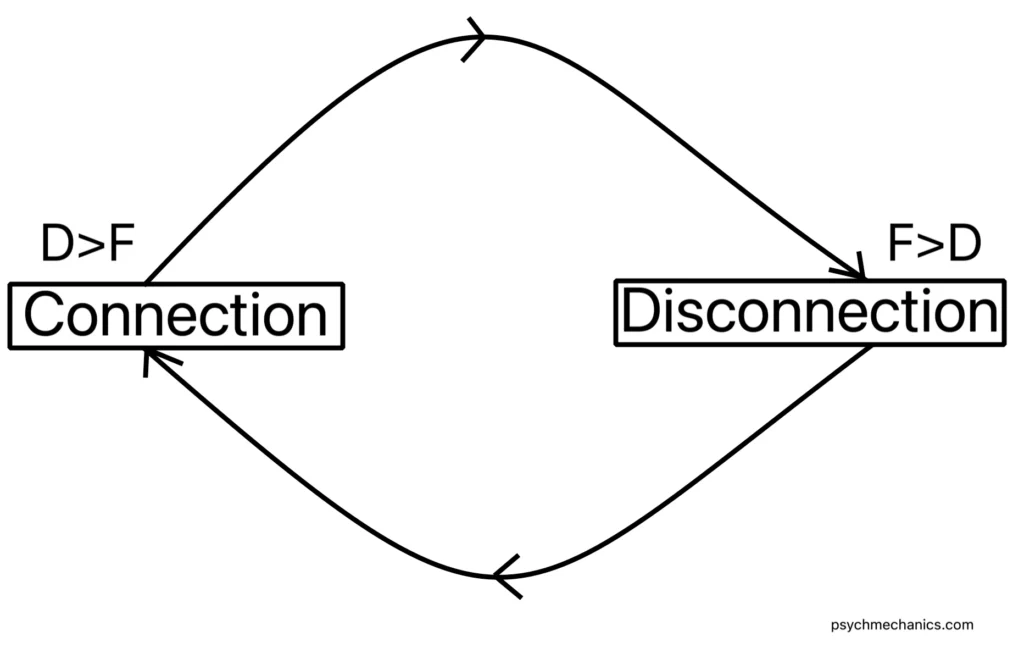Avoidants or those with an avoidant attachment style tend to avoid emotional closeness in relationships. They tend to value their independence more than their relationships. They have low love and connection needs. This doesn’t mean they don’t want connection at all. All human beings naturally want to connect and form close relationships. In the case of avoidants, however, there are more barriers to connection than in other attachment styles.
So, we get these individuals with a raging internal conflict between two opposing desires. On one hand, they don’t want to lose their independence, but on the other, they want to connect and enjoy intimacy. This internal conflict is reflected in how they behave in relationships.

When an avoidant enters a romantic relationship, everything’s lovely and charming when the relationship is still superficial. Their desire for connection is stronger than their fear of connection at this stage. When the relationship deepens and gets closer emotionally, the fear kicks in, and the avoidant feels the urge to disconnect. The fear of connection and intimacy gets stronger than the desire to connect. When they have disconnected for a while, the desire to reconnect re-emerges, and the cycle continues.

Signs an avoidant loves you but is fearful
1. Mixed signals
Even though avoidants typically disconnect in the later stages of the relationship, they might send you mixed signals from the start. One moment they’re present with you and give you their full attention. Soon after, they disconnect. When they think they’re giving you too much of their attention, fear of connection kicks in, and they withdraw.
Other times, they might withdraw because the interactions are too draining for them. Even if an avoidant loves you, they will become drained after a point. This doesn’t necessarily mean they’re ignoring you or avoiding connection. It’s just that they need a lot more ‘me time’ than the average person to recharge their emotional batteries. It’s the emotional overwhelm, not you, that they’re avoiding.1Andriopoulos, P., & Kafetsios, K. (2015). Avoidant attachment and the processing of emotion information: selective attention or cognitive avoidance?. Journal of Relationships Research, 6, e6.
2. Limited quality time
Avoidants enjoy spending quality time with the people they love. But they have limited social and emotional bandwidth. While you might think that talking once a week isn’t enough, your avoidant partner might think it’s more than enough. Talking once per week fills them up to the brim.
Because avoidants don’t value relationships much, they believe they should squeeze the maximum juice out of whatever bits of time they spend with you. They don’t want to just hang out. They want to have a good time when they’re with you. Even taking out a little bit of time from their day for you seems like a massive sacrifice to them.
Even if they enjoy spending time with you, there will come a point where they’ll feel like they’re wasting their time. Their sense of freedom and independence gets threatened when they over-invest in relationships or think they’re over-investing.
3. Reconnection bids
When an avoidant is done with you, they’ll disconnect and never reconnect. When they care about you, they will reconnect, but in small, indirect ways. Instead of calling or texting “How are you?” to you, they’ll maybe send a song or a meme. They’ll make an excuse for reconnecting with you, such as:
“I was watching your favorite TV show the other day, and it reminded me of you.”
Admitting they wanted to reconnect is too vulnerable for them, so they hide behind excuses and indirect initiations of contact.
4. Practical support
Acts of service is the primary love language of avoidants. They prefer giving and receiving love via practical vs. emotional support.2Girme, Y. U., Overall, N. C., Simpson, J. A., & Fletcher, G. J. (2015). “All or nothing”: Attachment avoidance and the curvilinear effects of partner support. Journal of Personality and Social Psychology, 108(3), 450. Oftentimes, emotional support doesn’t mean all that much to them. They have a sense of shame attached to their emotions, which is betrayed by their lack of emotional expression. Even if they deeply love you, they rarely say “I love you”. That’s too much emotional vulnerability for them to handle.
If they get jealous when you talk to someone, they’ll never admit it. Admitting they need you or are emotionally dependent on you undermines their sense of independence.
5. Deflecting emotional intensity
When an avoidant loves you, your interactions will inevitably get emotionally intense from time to time. Avoidants can’t handle intense emotions. They’d rather stay in analytical mode all the time. When interactions become emotionally intense, they’ll try to deflect by changing the subject, joking, or intellectualizing emotions, i.e., analyzing emotions instead of feeling them.
6. Regretting vulnerability
When an avoidant loves you and gets emotionally close to you, they’ll open up and share their innermost thoughts and feelings with you. It’s like they’ve been waiting to do this. The more difficult it is to get something, the more you value it when you get it. For avoidants, emotional intimacy is difficult to achieve, but when they get it, they cherish it.
If you, in any way, don’t honor their vulnerability, it’s over. They’ll never be vulnerable with you again. They knew it wasn’t safe being vulnerable with you. It took a lot for them to be vulnerable. They only tried because they loved you. If you break that trust or they perceive you broke it, they’ll deeply regret being vulnerable.
